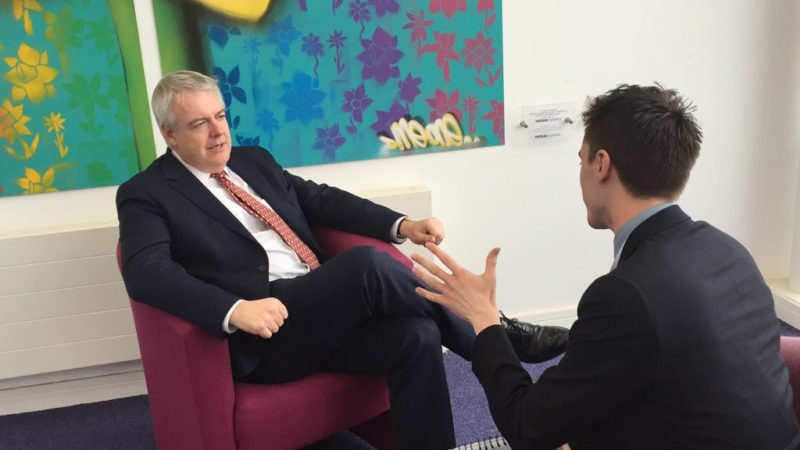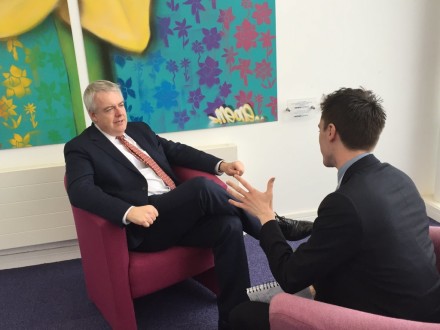

Labour will lose seats in Wales this May. Even a very good night for the party will see us move backwards.
This is by no means a disaster. The 2011 Assembly elections were a high point for Labour, winning enough seats to be able to govern alone – just one short of an overall majority. Receding slightly from this position is not much of a cause for concern, and all expectation is to emerge from the other side of May 5th still comfortably the largest party.
It certainly did not dampen the spirits of delegates gathered in Llandudno this weekend for Welsh Labour Conference, which, with over 900 attendees, was the largest in the party’s history. The mood generally is “really good”, according to Welsh First Minister Carwyn Jones, who I sat down to speak to shortly after his keynote speech.
That mood is plain to see. There has been a considerable membership rise: Welsh Labour has more members than Scottish Labour, despite a much smaller population. The new members appear to be as pro-Corbyn as you would expect, with the leader mobbed for selfies after his address on Saturday morning.
Jones welcomes the membership rise, but notes that “it’s not the entire story”. “What we need to make sure we have is activists,” he told me. “Membership is one thing, activists is another. But we do have plenty of people out on the streets knocking on doors and working up support.”
And while most of the membership may be swept up in Corbynmania, there are elements of concern around, with scepticism from voters noted on the doorstep. The Tories clearly see the UK leader as a weakness, and Conservative Assembly Members seem under strict orders to only ever refer to the governing party as “Jeremy Corbyn’s Labour Party”. Insiders posit that the election in Wales could be a good indicator of how effective the attacks on Corbyn will be in Labour heartlands, and the Tories may use it as a framework for a strategy in the north of England in 2020.
Going the other way, there are attempts to model a “Carwyn Jones’ Welsh Labour”, though. That’s nothing new; in his speech, Jones referenced the 30ft “Carwynzilla” banner of him that was revealed shortly after he became leader in 2009. Now seen as a safe pair of hands rather than the fresh-faced optimism he embodied back then, the First Minister has retained his status as an electoral asset.
Nor has Corbyn’s politics been fully adopted: the big announcement of conference was a pledge not to use newly-devolved powers to raise taxes. “This is not the time to burden people with extra tax,” was Jones’ firm reply, when I asked him about it. It is a very different line from Scottish Labour, who recently promised to raise income tax to fund education.
This framing of Welsh Labour as a separate entity with a different focus from the UK-wide party has long been a conscious decision. The Welsh party conferences, unlike those in Scotland, focus entirely on devolved issues – meaning no controversial debates around Trident renewal.
It is a move Jones credits with staving off a surge in Welsh nationalism: despite a massive boost in profile with last year’s televised general election debates, Plaid Cymru look unlikely to make inroads this May.
“We took a conscious decision in 2009 that we would harness the patriotism of the Welsh people; the people who wear their red shirts watching Wales in the Millennium Stadium,” Jones says on the topic of fighting Plaid. “I think a lot of those people in Scotland, who are not in favour of independence, but are strongly pro-devolution and strongly proud of their identity, drifted to the SNP – even though they may not themselves be in favour of independence. We wanted to make sure Welsh Labour appealed to those people and didn’t drift off to Plaid.”
But the electoral challenge posed in 2016 is much different to 2011, and nationalism is a factor, in the form of UKIP.
“We have to take them seriously,” Jones told me. “We saw what happened in the general election.”
Having seen their numbers of votes rise from 35,000 to over 200,000 in the general, the anti-EU party are significantly increasing the number of candidates they are standing for Assembly, and are expected to return some AMs for the first time.
Yet Jones does not see Labour/UKIP marginals emerging: “UKIP’s threat is not to take seats from us directly, but to take votes from us and cause us to lose seats indirectly. For Labour voters thinking of voting UKIP, the reality is all that will do is let the Tories in.”
The tactic for tackling the UKIP threat looks remarkably similar to the SNP’s attacks on Scottish Labour. With a Welsh leader and Senedd candidates effectively appointed by Nigel Farage, Jones says dismissively that “the whole thing seems to be run by remote control from London”.
Many within Welsh Labour hope that another successful campaign can be a blueprint for further success for Labour across Britain. However, the conference saw a theme of trying to prove what could be done in power, rather than how to get there – it was certainly the argument Shadow Wales Secretary Nia Griffith made.
She described the focus of her speech to me as “the huge contrast there is between having Labour in government here in Wales, and how we’ve been able to show how we can do things differently, and how we can present a living example of that alternative. It’s not just a theoretical, on paper: ‘we would’.”
In a telling section of her address, she slammed “those who say we should be happy just shouting from the side-lines”, and derided the idea that “principled opposition is better than political power”. “If we take that attitude we may as well shut up shop,” she said.
As the UK’s only Labour Government, Wales does show what can be done when Labour is in power. But it is what the voters, rather than what the party does, that could tell us more about Labour’s future.



More from LabourList
London mayor elections: Labour urges probe into Tories’ fake driver fines
Cass report: ‘Here’s why politicians should not treat it as gospel’
NEC steps in again in under-fire Birmingham to reappoint leaders